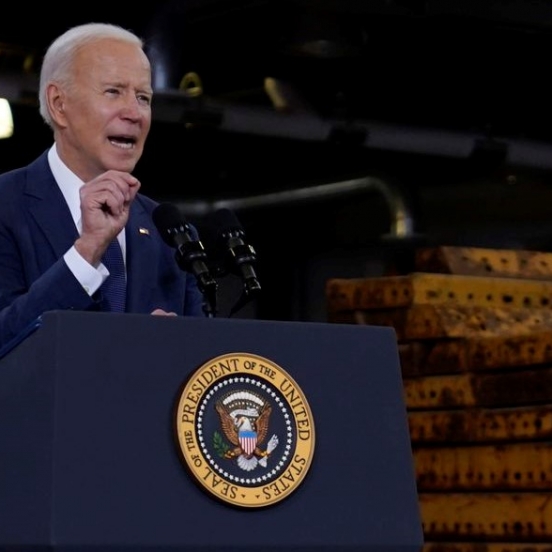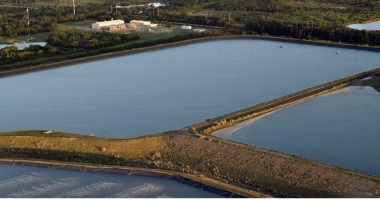Climate, Health and Equity Brief
Jobs, Justice and Clean Energy
April 5, 2021

The Climate, Health & Equity Brief is GMMB’s take on the week’s news on the current impacts of climate change. If you haven’t subscribed yet, you can do so by clicking here.
Hot Topic: Turbocharged. President Biden introduced the American Jobs Plan on Wednesday in Pittsburgh, Pennsylvania, a city known for its industrial past, setting the nation’s course toward a clean energy future. The historic and long-awaited $2 trillion infrastructure plan proposes an economy with the transition to a net-zero future at its core—not as an added benefit, but rather the way through which we will pursue a healthier and more equitable nation. Among other things, the budget proposal:
- Commits $180 billion in funding for research and development, with a focus on clean energy technology to reduce emissions and build climate resiliency;
- Earmarks $174 billion to build out a network of at least 500,000 EV charging stations across the country;
- Sets aside $100 billion to modernize the U.S. electrical grid and extend tax credits for renewable energy projects;
- Underscores the administration’s commitment to environmental justice by pledging $16 billion to plug old oil and gas wells and abandoned coal and uranium mines that disproportionately impact low-income communities and communities of color;
- Places an emphasis on job creation through green industry, like the production of batteries and parts for electric vehicles; and
- Calls for the creation of a Civilian Climate Corps, which would institute an estimated 20,000 environmental resiliency jobs annually.
Elevating these climate priorities counters Republican critiques that a transition to clean energy will result in massive job losses and a hit to the national economy. The plan’s emphasis on boosting industrial strength through the creation and acceleration of new American industries also counters GOP arguments that ending the fossil-fuel era will make the U.S. less competitive globally.
However, with Democrats holding the narrowest possible majority in the Senate, the plan’s path to approval may prove challenging. Already, Republican lawmakers are sounding the alarm over President Biden’s proposal to raise corporate taxes to pay the plan’s $2.3 trillion price tag and labeling its investments in climate action as extraneous.
Regardless, President Biden’s American Jobs Plan is the biggest step yet toward achieving net-zero emissions by 2050 while investing in America’s future.
— Matt & Traci, GMMB
Politics & Economy
A more than $2 trillion infrastructure plan unveiled by President Biden this week features a major focus on advancing his administration’s climate agenda, including $180 billion in funding for clean energy research and innovation and $174 billion in grant and incentive programs to establish a national EV charging network. (The Washington Post)
A new program announced by the Biden administration will offer $3 billion in federal loans for offshore wind projects as part of a broader goal to deploy 30,000 MW of wind energy along the East Coast—enough to power 10 million homes—by 2030. (The New York Times)
“This is not a plan that tinkers around the edges. It is a once-in-a-generation investment in America.”
-President Joe Biden
Health
A new World Health Organization study warns that without a significant reduction in global emissions, half of the world’s population could be living in water-stressed regions in less than four years due to intensifying extreme weather events. (Bloomberg)
A recent satellite-based survey revealed that the Earth lost nearly 100,000 square miles of forest last year due to wildfires, illegal clearing, agricultural expansion and drought—contributing the equivalent of 2.6 billion tons of C02 to the atmosphere and minimizing the forest’s ability to serve as a carbon sink. (The Washington Post)
A new study analyzing more than 170,000 pediatric hospital admissions in California between 2011 and 2017 found that wildfire smoke was associated with a 30-percent spike in admissions for respiratory concerns, compared to 3.7 percent from other sources of air pollution. (STAT)
Flash floods resulting from the second-highest rainfall levels ever to befall Nashville have killed at least seven people, forced hundreds more to evacuate and destroyed dozens of homes and businesses. (CNN)
Equity
The Biden Administration formally introduced its Environmental Justice Advisory Council this week, which will work with other federal groups to address environmental inequalities faced by low-income communities and communities of color. (The Hill)
Experts warn that climate-fueled extreme weather events like last year’s back-to-back hurricanes that displaced hundreds of thousands across Guatemala, Honduras and Nicaragua will exacerbate mass migration already spiking due to COVID-19-related poverty. (CNN)
A recent investigation revealed that communities living near Georgia’s largest coal plant have cancer incidence rates up to 17 percent higher than the national average due to coal ash ponds—used for the disposal of toxic waste—contaminating local drinking water. (ProPublica)
Ahead of Louisiana’s 2nd Congressional District special election later this month, both Democratic hopefuls are focusing on the long-standing and historically overlooked effects of industrial pollution in south Louisiana’s Cancer Alley to drive concerned voters to the polls. (The Guardian)
Action
New emissions regulations adopted by the state of New Mexico will require oil and gas operators to capture 98 percent of all natural gas waste by 2026 and limit flaring to emergency situations only. (AP News)
A sweeping climate law signed by Massachusetts Governor Charlie Baker (R) commits the state to a 50-percent reduction in greenhouse gas emissions by 2030 and sets tougher standards for new energy and infrastructure projects in low-income communities and communities of color. (E&E News, NPR)
Kicker
Want to take part in choosing the best photos of Earth taken by International Space Station astronauts? Cast your votes in the semifinal round of this tournament hosted by NASA.

)





